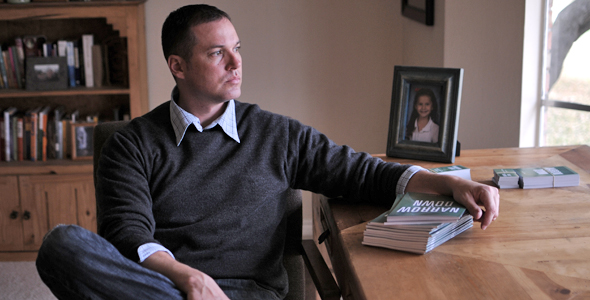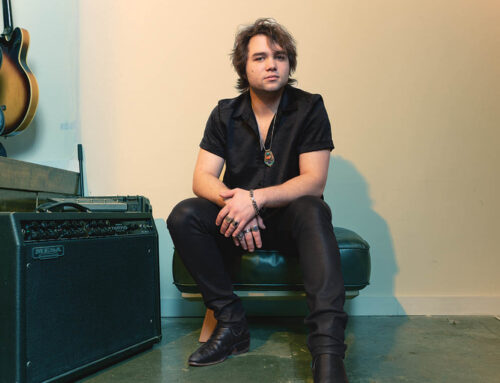From practically nothing to go on, Cpl. David Bates started the renowned Leadership Cadet Program at T.C. Marsh in ‘98 after a school principal, whose flat tires he changed on the side of the road, offered him a job. Bates later rallied the support of neighbors and built a military museum on campus. Now he’s done a little something for himself and his own family, and subsequently for an audience of readers, in writing his memoir, “Narrow It Down.” The book is for teachers, leaders and anyone who needs to cut out some of the excuses in their lives and start achieving greatness.
What inspired “Narrow It Down”?
My father died before I got to know him as a man, and vice versa. So I thought in case something happened to me, I should leave something so my daughter would know who I am.
Did your father die recently?
No, he died when I was a young man. When I got the idea to write the book, I had been coming home late from work a lot, and by the time I got there, my daughter was already in bed. I thought I was missing a lot of her growing up. I started out writing a memoir, and then it turned into my philosophy and advice for the masses. I put it together and sent it somewhere, and someone said, ‘It’s pretty good; we’ll put a cover on it.’ And the next thing you know, it was available on Amazon.
When does one turn into a “man”? When did you decide that for yourself and think your thoughts were worth sharing in a book?
When you’re a teenager you think you know everything. You think, ‘I’m a man now.’ You see your father as this guy who is always telling you what not to do. You don’t realize what your father is. You don’t realize it until you get the experience of college, the military or become a parent yourself. When can you say you are a man yourself? Post college and a year or two into the workforce. When you’re paying the bills. [Laughs]
How long were you in the military?
Three years and 17 weeks. I was a mortarman in the Airborne Infantry. I trained to kill people. I’m not saying I did; I’m just saying that was my job.
Did you become serious about things after joining the military?
Years after. In the military, you do what you’re told. You go out and about to places that are different from what you know. It wasn’t until I was working with children that I started thinking about the future —the future of the country, but I focus on my area. I have a hand in the area of education in the state of Texas. I met with guys from Guam and Saipan to talk to them about how I teach. They found my teachings online through my book.
Is “Narrow it Down” aimed at educators working with students?
It’s for everybody. There is a chapter called ‘No Excuses’ about how we can do anything we want. I learned a long time ago my first sergeant didn’t care what my excuse was. All he cared about was that there was no excuse. I took that and learned from that.
Is there a certain chapter or section of the book you feel strongest about or closest to?
The chapter based on what the title is about, chapter 12. It’s about narrowing down what we can directly influence. In our lives there is a ‘ring of influence’ and a ‘ring of concern.’
What does that mean?
What you can actually influence is what you should focus on. Teachers and everybody live inside the realm of concern. Instead of worrying about what you don’t have control over, worry about things like your local government and your neighborhood. Worry about where you live.
What happens if you can’t help but feel concerned?
Sometimes you just need to refocus a lot of your efforts, and the ring of influence will get bigger and bigger.
What reactions have you received?
People really like it, but some people said they wanted more. They wanted me to expand on my chapters. They said it reads exactly like I sound. There’s a typo in here and I like that. Because it’s personal and genuine.
Are you still writing? Are you content?
I am content with the book. I’d like to talk more to people about it. Like when I’m invited to speak. I enjoy talking to groups when they have questions. I’ve done a couple of those, and it’s been people who’ve read the book and have questions about it good or bad. I don’t want to write anymore, though.
If anybody could take one thing away from what you wrote, what do you want that to be?
Really, there are no excuses. I really like that whole attitude, and in the book I tell you how I got it. One day, in the military, we were on a run and the first sergeant comes and runs with us. One mile passes, then two, then three, then at four guys start falling out to catch their breath. I do the same. The first sergeant asks the one man, ‘Why did you fall out?’ and he says it’s because he felt sick that morning. He asks the next guy and he says it’s because he didn’t get to eat the night before. By the time he got to me, I figured it out. I said, ‘I don’t have an excuse, First Sergeant.’ I literally took that from that day forward. If you can think it, it can be done. I said, let’s just teach that to the kids. There is no excuse if you take out all the cons.
“Narrow It Down” is available at amazon.com for $8.99.
Read more about David Bates and his work in the school and community in the advocate.






